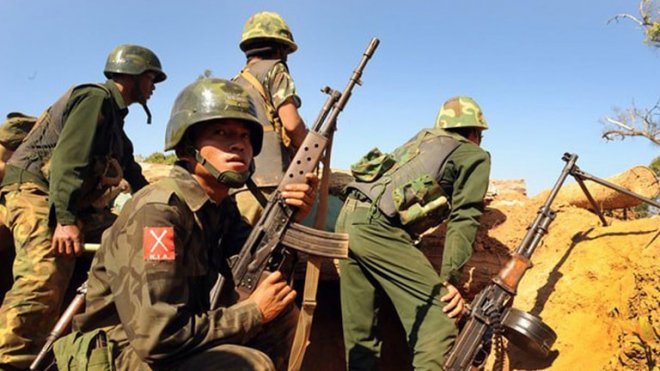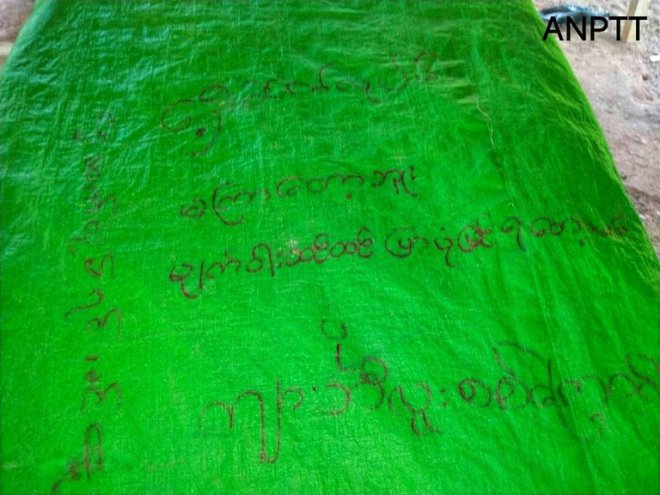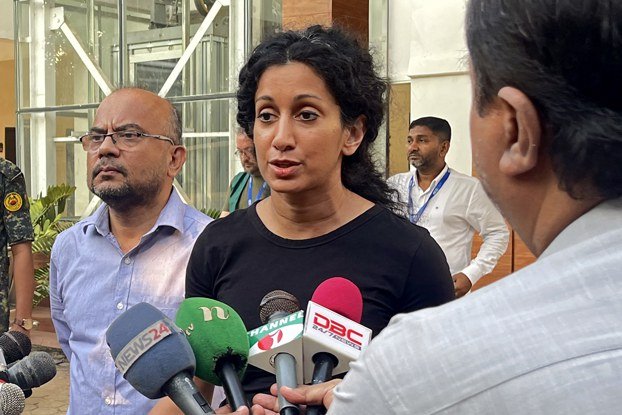Former Solomon Islands official ousted from post 'after turning down Chinese bribes'
Daniel Suidani, an outspoken critic of the Solomon Islands’ closer ties with China, was ousted as premier of Malaita in early February after refusing "huge" bribes from Chinese businesses who threatened to have him removed, he told Radio Free Asia in a recent interview.Suidani, who is now in the United States, said his ouster was directly orchestrated by agents of the Chinese state after he proved uncooperative.
"It seems to be a normal thing for them to come to my office with huge money," he said. "One time I closed down a Chinese shop in my province for not following the procedures to operate in the province, and they gave me lots of money, saying ... ‘This money is for you and your children, to allow our business to continue, because we employ more of your people.’"
The Chinese business owners also told Suidani: "You know you will be here for only four years and you will finish," he said.
"I said no ... I cannot allow dishonesty in my province," he said, adding that one bribe he was offered had amounted to a million Solomon dollars, or about US$120,000.
"After I refused this ... and [went] against their will, they tried their best to get me out of being premier of Malaita, bringing three motions of no confidence against me."
The first motion was still OK because the people stood very strong, and the second was still OK, but [before] the third one, the central government used patrol boats and firearms and police to calm down the people"s protest," he said.
"Even before the motion, the police ... closed down the roads."
He added: "[Now], there is no one in the province who have the heart to stand for democracy, for freedom."
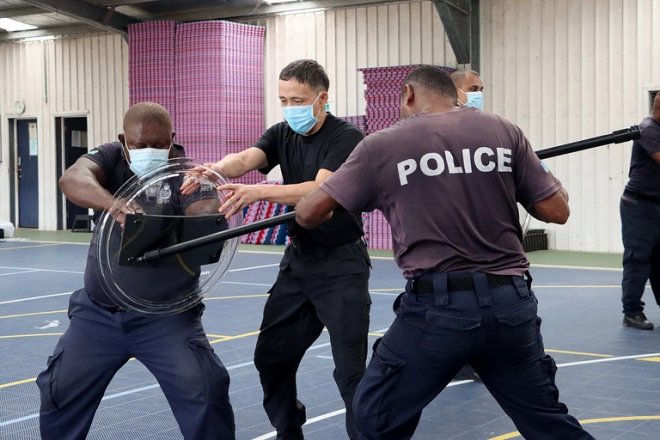 An undated handout photo released on March 29, 2022 by the Royal Solomon Islands Police Force (RSIPF) shows a China Police Liaison Team officer (C) training local RSIPF officers in drill, unarmed combat skills, advanced usage of long sticks, round shields, tactical batons, T-shape baton, handcuffs, basic rifle tactics and crowd control. Credit: Handout/RSIPF/AFP
An undated handout photo released on March 29, 2022 by the Royal Solomon Islands Police Force (RSIPF) shows a China Police Liaison Team officer (C) training local RSIPF officers in drill, unarmed combat skills, advanced usage of long sticks, round shields, tactical batons, T-shape baton, handcuffs, basic rifle tactics and crowd control. Credit: Handout/RSIPF/AFPUndermining democracy
According to Suidani, Beijing"s growing financial and political influence in the country is undermining his country"s democracy, press freedom and extending its influence into all areas of economic and political life.
He said Chinese companies have "changed their behavior" since Prime Minister Manasseh Sogavare switched diplomatic recognition from Taipei to Beijing in 2019.
"There are so many changes that happened after ... what we call the Switch," Suidani said. "When China came in, they ... supplied apparatus like computers and other things to the media."
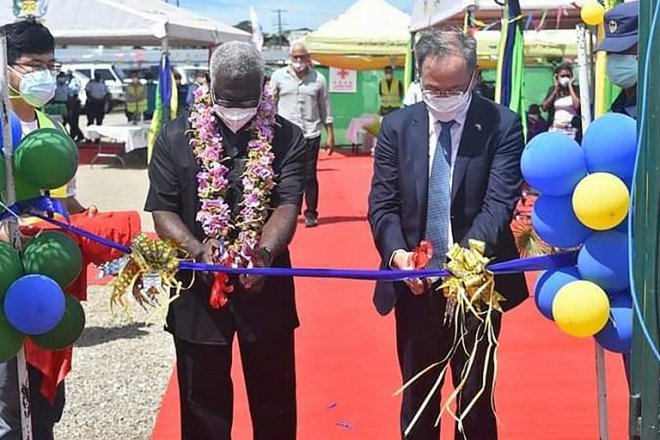 China"s ambassador to the Solomon Islands Li Ming
China"s ambassador to the Solomon Islands Li Ming , and Solomons Prime Minister Manasseh Sogavare cut a ribbon during the opening ceremony of a China-funded national stadium complex in Honiara, April 22, 2022. Credit: AFP
He said one media organization in Honiara has a Chinese liaison official installed at its headquarters to ensure coverage is in line with Beijing"s propaganda goals.
"So the news has been is not neutral ... They already give biased information," he said. "They talk about something not true [and] everything about China always comes to the front page."
The Chinese Embassy’s official website showed examples of several articles signed by its Ambassador Li Ming in recent years, published in Solomon Islands newspapers.
A news release dated March 29 marked the meeting between Li and Suidani’s replacement, Malaita Premier Martin Fini, in which Li “acknowledged [the provincial] government’s firm support to the national government’s China policy.”
“He assured the delegation that the Chinese Embassy would support and encourage provinces and companies of China to conduct goodwill and mutually beneficial exchanges and cooperation with Malaita province,” the report said.
Pacific island nations
China’s ties with small island nations in the Pacific have burgeoned over several decades as it seeks to isolate Taiwan diplomatically and establish its own institutions and diplomatic groupings to rival a post-World War II international order dominated by the West.
Last year, Beijing forged a security pact with the Solomon Islands, alarming the United States and its allies.
The Chinatown in the Solomon Islands capital Honiara was torched in rioting in November 2021 that was fueled by anti-Chinese and anti-government sentiment, and the government requested security assistance from Australia and other countries to suppress the protests.
The protesters, mainly from Malaita, the country"s most populous province, were reportedly opposed to the national government’s tilt to closer relations with Beijing and angered by unequal economic development in the Pacific island country.
According to Suidani, there are also concerns about moves to gain a security foothold on the island.
"There"s a lot of things happening in the police and the security," he said. "We have seen something like [Chinese] police training local police, and they go to the villages and train the people right in the village about self-defense."
"Not only that, they have been bringing like vehicles and gear, big vehicles that we haven"t seen before in the country," he said. "The question is what"s all these things for?"
Targeting the elite
According to Suidani, the Chinese Communist Party"s influence operations started off by targeting the country"s elite.
"They started [with] money – they used it for influencing the well-educated, some of them, and those in the government, and they [worked faster] than any other donor partner could do," he said.
![]() Debris lies on the street outside damaged shops in Chinatown during two days of riots, sparked by underlying grievances, including concerns of the country"s increasing links with China, Honiara, Solomon Islands on Nov. 26, 2021. Credit: Associated Press
Debris lies on the street outside damaged shops in Chinatown during two days of riots, sparked by underlying grievances, including concerns of the country"s increasing links with China, Honiara, Solomon Islands on Nov. 26, 2021. Credit: Associated Press
He said Beijing"s infiltration of the Solomon Islands had begun in the capital and spread out to its provinces.
"Mainly before the Chinese people came to Honiara, as [their] headquarters, as the capital, but as time goes on, they shift to the provinces in terms of development, in retailing and other things," Suidani said.
"When it comes to the logging industry, one of the things that changes much is the behavior, the attitude of the people ... There is no respect at all."
He said Chinese companies" inroads into the timber industry had "created a lot of disunity, because of the damage and aiming of the benefit out of the resources that people used to come together sharing equally among themselves."
U.S. Indo-Pacific commander Adm. John Aquilino said in March that China’s inroads into the Solomon Islands had been a "wake-up call" for Washington, adding that U.S. security ties with the country were "back on track."
Translated by Luisetta Mudie. Edited by Malcolm Foster.
[圖擷取自網路,如有疑問請私訊]
He said one media organization in Honiara has a Chinese liaison official installed at its headquarters to ensure coverage is in line with Beijing"s propaganda goals.
"So the news has been is not neutral ... They already give biased information," he said. "They talk about something not true [and] everything about China always comes to the front page."
The Chinese Embassy’s official website showed examples of several articles signed by its Ambassador Li Ming in recent years, published in Solomon Islands newspapers.
A news release dated March 29 marked the meeting between Li and Suidani’s replacement, Malaita Premier Martin Fini, in which Li “acknowledged [the provincial] government’s firm support to the national government’s China policy.”
“He assured the delegation that the Chinese Embassy would support and encourage provinces and companies of China to conduct goodwill and mutually beneficial exchanges and cooperation with Malaita province,” the report said.
Pacific island nations
China’s ties with small island nations in the Pacific have burgeoned over several decades as it seeks to isolate Taiwan diplomatically and establish its own institutions and diplomatic groupings to rival a post-World War II international order dominated by the West.
Last year, Beijing forged a security pact with the Solomon Islands, alarming the United States and its allies.
The Chinatown in the Solomon Islands capital Honiara was torched in rioting in November 2021 that was fueled by anti-Chinese and anti-government sentiment, and the government requested security assistance from Australia and other countries to suppress the protests.
The protesters, mainly from Malaita, the country"s most populous province, were reportedly opposed to the national government’s tilt to closer relations with Beijing and angered by unequal economic development in the Pacific island country.
According to Suidani, there are also concerns about moves to gain a security foothold on the island.
"There"s a lot of things happening in the police and the security," he said. "We have seen something like [Chinese] police training local police, and they go to the villages and train the people right in the village about self-defense."
"Not only that, they have been bringing like vehicles and gear, big vehicles that we haven"t seen before in the country," he said. "The question is what"s all these things for?"
Targeting the elite
According to Suidani, the Chinese Communist Party"s influence operations started off by targeting the country"s elite.
"They started [with] money – they used it for influencing the well-educated, some of them, and those in the government, and they [worked faster] than any other donor partner could do," he said.
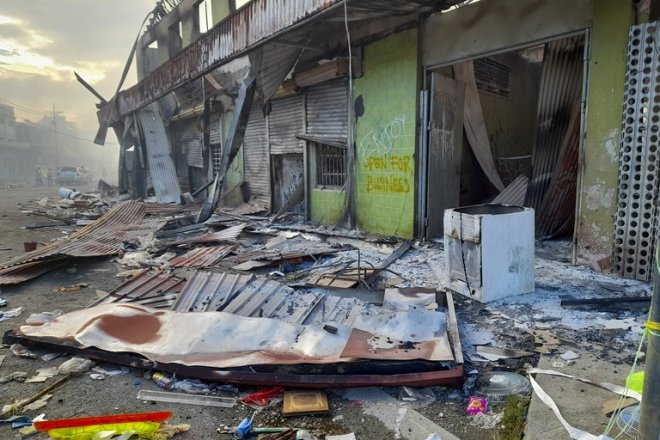 Debris lies on the street outside damaged shops in Chinatown during two days of riots, sparked by underlying grievances, including concerns of the country"s increasing links with China, Honiara, Solomon Islands on Nov. 26, 2021. Credit: Associated Press
Debris lies on the street outside damaged shops in Chinatown during two days of riots, sparked by underlying grievances, including concerns of the country"s increasing links with China, Honiara, Solomon Islands on Nov. 26, 2021. Credit: Associated PressHe said Beijing"s infiltration of the Solomon Islands had begun in the capital and spread out to its provinces.
"Mainly before the Chinese people came to Honiara, as [their] headquarters, as the capital, but as time goes on, they shift to the provinces in terms of development, in retailing and other things," Suidani said.
"When it comes to the logging industry, one of the things that changes much is the behavior, the attitude of the people ... There is no respect at all."
He said Chinese companies" inroads into the timber industry had "created a lot of disunity, because of the damage and aiming of the benefit out of the resources that people used to come together sharing equally among themselves."
U.S. Indo-Pacific commander Adm. John Aquilino said in March that China’s inroads into the Solomon Islands had been a "wake-up call" for Washington, adding that U.S. security ties with the country were "back on track."
Translated by Luisetta Mudie. Edited by Malcolm Foster.
[圖擷取自網路,如有疑問請私訊]
|
本篇 |
不想錯過? 請追蹤FB專頁! |
| 喜歡這篇嗎?快分享吧! |
相關文章
AsianNewsCast








